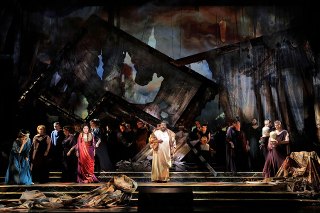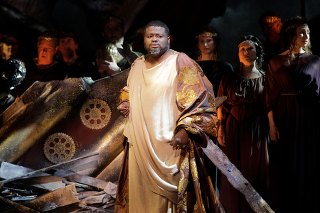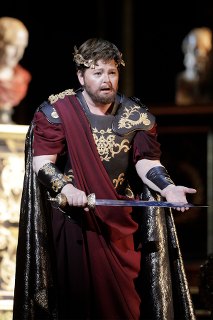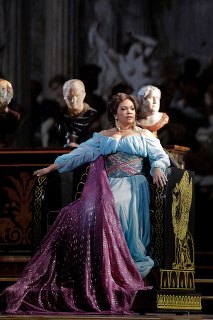|
Back
Clemency and opulence for all Los Angeles
Dorothy Chandler Pavilion
03/02/2019 - and March 7, 10, 13, 16, 24, 2019
Wolfgang Amadeus Mozart: La clemenza di Tito, K. 621
Russell Thomas (Titus), Elizabeth DeShong (Sesto), Guanqun Yu (Vitellia), Janai Brugger (Servilia), Taylor Raven (Annio), James Creswell (Publio)
Los Angeles Opera Chorus and Orchestra, Jeremy Frank (chorus preparation), Roberto Cani (concertmaster), Bryndon Hassman (harpsichord), Stuart Clark (basset horn), James Conlon (conductor)
Thaddeus Strassberger (stage director, set designer), Mattie Ullrich (costume designer), JAX Messenger (lighting designer), Greg Emetaz (projection designer)

G. Yu, R. Thomas (© Cory Weaver)
Opera isn’t a historical re-enactment as such, though its foundation can bend more closely to the truth than others. While Thaddeus Strassberger’s 2017 Nabucco telescoped into La Scala’s 1842 premiere, La clemenza di Tito unbraids the emperor’s decisive factuality and, more impressively, capitalizes on fictionalized love interests set to music. And while an indomitable “Strassberger opulence” of calico textures and colors once again consumes the stage, there’s an over-affection of gaudiness detracting from the cachet of Mozart’s rarefied and treasured arias, duets, ensembles and choral responses.
With the senses supplemented by lavish frothing of lighting and projection by debuting JAX Messenger and Greg Emetaz, respectively, the question should be asked, “What about Mozart’s music?” As an argument to the aforementioned, however, M. Strassberger’s multi-layered scrims permeate the stage with depth and enhance movement that could, otherwise, become static. In particular, one subdominant proscenium arch brackets many choice numbers, so a certain focus does tend to move balance back into a Mozartian plane.

R. Thomas (© Cory Weaver)
Typically, Tito Vespasian is not an interesting character, but Russell Thomas has had plenty of experience in perfecting and adding dimension to this rôle. Returning from a successful Norma M. Thomas enjoys the ability to now absorb all ideas from varying sources so he can tailor the character he’s portraying to a particular production. Such is the case with Los Angeles Opera’s (LAO) Tito: there’s a benevolent palate of luxuriance that gives the opera stately stability on a noble front. His dimensional mood swings are well gelled and his disapprobation of Sesto (upon learning of his evil plot) suddenly stuns the audience into total silence. This tenor creates an umbrella of wholesome magnanimity as the 79 A.D. Flavian ruler, and, indeed, Russell Thomas exemplifies Tito as the “Mouthpiece of divine foregiveness.”

E. DeShong (© Cory Weaver)
“Clockwork consistency” is synonymous with James Conlon, and it remains that way in this La clemenza di Tito. In an earlier conversation with M. Conlon, he refers to Elizabeth DeShong’s affinity for singing her lines very rapidly. Not only is she one of the most pronounced characters singing on a scale of realized depth and passion, she easily delves through her “Parto, parto” with pristine dexterity, especially when buoyed by the bubbly basset clarinet obbligato.
But it’s Vitellia that holds the key to La clemenza di Tito’s dramatic and twisted tension. Mozart’s spurned daughter of deposed Emperor Vitellio has the widest range of emotional and vocal coverage. Guanqun Yu’s technical aspects, while commanding and cleanly executed, leave little room for well-apportioned animation. The tension is impalpable, and it doesn’t “domino” into the remaining principals. Perhaps the grandest aria, Vitellia’s rondo, “Non più di fiori”, has the viewer more obsessed about how the movement of her infinitesimal red train will parade along the floor, though it also tends to nicely add a tangible divertissement, thus placing more attention on an auditory focal point and honing in on Stuart Clark’s magically fluidic basset horn obbligato.

J. Brugger (© Cory Weaver)
Warmth and strength gives composure under Janai Brugger’s Servilia: she endures and she remains a bastion of honesty and goodness that's well-served by the genuine humaneness of her soprano voice. Taylor Raven’s Annio, Servilia’s love interest, holds up substantially well. Their duet, “Ah, perdona al primo affetto”, adds an early-on heartfelt touch to the score. The bass equation is reserved for longtime LAO’s James Creswell as he remarks with bold distinction as the Praetorian prefect, Publio, though his movements seem a bit quirky at times and looks more like Moses.
The deeply immense color palette housing the costuming by Mattie Ullrich adds to an already overly saccharine setting. Individually, their intrinsic values are apposite, yet the marriage yields an excessive Carleton Varney of sorts.
Undoubtedly, Thaddeus Strassberger’s production is administered by careful introspection, and it dwarfs Nabucco’s earlier “over-the-top” staging…audiences likely will be astounded and awed by this juggernaut artistry. Let’s hope we don’t forget about Wolfgang Amadeus Mozart. Isn’t it about the music, too?
Christie Grimstad
|